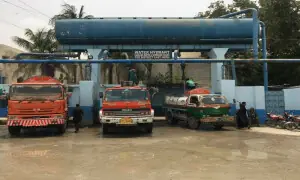Hey Karachi’s rich people, air purifiers won’t save you: experts
4 min readYou can be rich and buy expensive air purifiers in Karachi but it still won’t stop you from getting sick, warns climate expert Dr Kulsum Ahmed. She said a recent study on precautions taken by the rich have not saved them from catching airborne diseases. The very large hospitalization numbers in Karachi testify to this.
Dr Kulsum was one of a panel of experts who talked about Karachi’s air quality at a seminar on Monday. She said that one alarming aspect of poor air quality is that it causes stunting in people, and that around half of those stunted are basically children or those under the age of five years. “Also, 128,000 lives are lost every year in Pakistan because of toxic air quality. The average Pakistani life expectancy goes down by 4.3 years every year,” she said.
Sophia Hasnain, CEO of Linked Things Air Quality, the largest Air Quality Monitoring Network in Pakistan, said that according to 20 air quality monitor results, air pollution in Karachi is highest at 8am and 2pm. Korangi Industrial Area has the worst air pollution.
“Half the sky is gray, which is a sign of bad air pollution. You can tell the difference between the air quality after it rains and the everyday air quality,” she said.
The environment experts and doctors argued that Karachi’s population needs to be capped and migration controlled as one of the measures to start tackling air quality.
The seminar was organized by the Karachi Citizens Forum and was held at the Pakistan Medical Association House.
The speakers suggested increasing the number of air quality monitors from the present 40 to 150 to 200 to cover an area of 3,780 km² and a population size of more than 22 million. They also said:
- Start public compost farms to use kitchen and garden waste and gain revenue
- Get sewerage treatment plants working
- Shift from fossil fuels and coal to solar, hydropower, and wind energy
- Check the quality of fuel used by factories and vehicles
- Penalize substandard fuel suppliers and users
- Treat wastewater to irrigate green spaces
Karachi remains at the top of the list of the world’s most polluted and unlivable cities, as well in the top ten with extremely toxic air quality.
Dr Qaiser Sajjad said the toxic air quality of Karachi, and especially the inhalation of particulate matter, is the number one public health threat. “It takes a tragedy like the Keamari deaths to raise the alarm. There should be no factory in residential areas and those responsible for operating such an outlet should be punished under the law,” he said.
Dr Abdul Ghafoor Shoro of the PMA said that air pollution is linked to so many illnesses including cancer, gastrointestinal disorders, and cardiovascular and kidney diseases. “It’s high time that the government take notice of the situation and start implementing measures to improve air quality,” he said.
“Pakistan has defaulted economically, but an environmental default will hurt us more,” Convener of Karachi Citizens Forum, Nargis Rehman, said. She added that 60% of the people in Karachi are poor and air pollution affects them more.
Former chairman of the Sindh Industrial Trading Estate (SITE), Shariq Vohra, claimed that the federal climate change ministry is doing nothing apart from collecting funds from international donors. He said the provinces still have no such government departments and resources to deal with climate change.
“Pakistan is a small industrialized country, and Karachi especially has very well-planned industrial zones, but unfortunately, the authorities are not interested in controlling air pollution.”
Climate activist Yasir Husain called upon the government to make the Sindh Environmental Protection Agency effective and implement the Sindh Quality Index. “There’s no lack of data on the air quality of Karachi, there’s only a lack of action. We need the government to take this matter seriously and form a committee for a permanent solution,” he said.
He said that the use of petrol, diesel, and oil needs to be reduced and electric vehicles need to be introduced in order to improve the air quality of the city.
Dr Noman Ahmed, Professor of Architecture and Planning at NED University, believes that Karachi’s biggest issue is unplanned construction in the suburban areas of the city which has led to the city’s extreme loss of green cover over the years. He said that 10 percent of the city must be specified for trees and nature.
“The waste management system in the city is horrible and needs work. Every household in Karachi suffers from serious diseases and it is due to air pollution. The regulatory bodies must play their role to improve the air quality,” he said.
For the latest news, follow us on Twitter @Aaj_Urdu. We are also on Facebook, Instagram and YouTube.























Comments are closed on this story.